As the Dartmouth community and the nation celebrate Veterans Day, honoring the sacrifices that American military members and their families have made for their country, Geisel is proud to recognize and thank its student, faculty, and staff veterans for their service.
While each student veteran’s circumstances and decision to enter the U.S. Armed Forces was unique, they share a passion for defending the freedoms we enjoy as Americans and for healing those who are injured and sick.
Below, a few of our Geisel student veterans reflect on some of the valuable lessons they learned during their time in the service and the impact those experiences have had on their path to medicine.
John Rode ’21
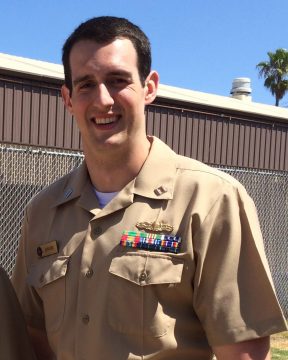
After graduating from Connecticut College in 2009, Lieutenant John Rode attended the U.S. Navy’s Officer Candidate School and served as a surface warfare officer on active duty until 2016.
Rode was first stationed on board the USS Kidd out of San Diego, California, serving as the main propulsion officer and completing a deployment throughout the Western Pacific and Middle East.
Later stationed on the USS Boxer as an amphibious landing planning officer working off the coasts of the Philippines, Djibouti, and Jordan, he had the “once in a lifetime opportunity” to volunteer in the ship’s medical department. Ultimately, it was this experience that reinvigorated his childhood desire to be a physician.
“By far the most rewarding responsibility the Navy gave me was that of leading the remarkable men and women who choose to serve our country,” says Rode. “It was moments spent caring for my sailors’ safety and well-being and empowering them to accomplish their goals that led me to transition my career into medicine to care for others, just as I had done for them.
“I will always be grateful for my service and the innumerable leadership, communication, and life skills I acquired throughout my time in uniform,” he says. “These are skills that I hope to use in becoming a competent, caring, and compassionate physician.”
Steven Johnson ’22
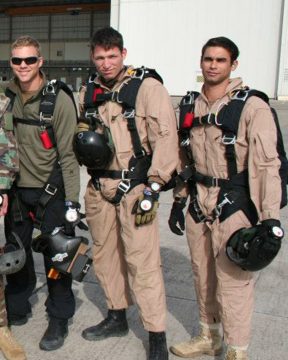
A 10-year veteran of the Navy, Lieutenant Commander Steven Johnson was selected into the Navy Special Operations, EOD (Explosive Ordnance Disposal, i.e. bomb squad) community after graduating from Norwich University in 2004.
Following training, Johnson completed tours in Italy and Iraq, and was stationed throughout the U.S. in a variety of positions—including U.S. Secret Service details, diving and underwater salvage, robotics, and research and development—along with his standard Navy bomb squad duties.
“The number one lesson I learned from my military experiences was that you’re not special, you’re lucky—so act like it and don’t be a jerk,” says Johnson. “Large organizations will chew you up, spit you out, and forget you existed. And even when you know that fact, it’s still very easy to become so driven by productivity metrics and obtaining the ‘next level’ of success.”
Ultimately, he believes that what matters most is people. “Small kindnesses and considerations can have a lasting impact on the lives of those around you, especially when they’re in pain,” says Johnson, who after retiring from active duty service conducted research in PTSD symptomatology mediators in combat veterans.
Overall, Johnson says that serving in the military prepared him for a career in medicine by teaching him how “to take a ‘hit,’ stay positive, and keep moving forward.”
Richard Pace ’22
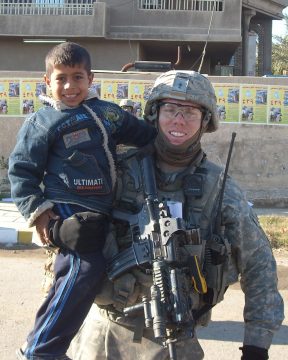
Army Captain Richard Pace graduated from the U.S. Military Academy at West Point in 2005 with a degree in systems engineering. He then served as an infantry officer in the Army for nearly eight years, including 15 months as a platoon leader in Iraq as part of Operation Iraqi Freedom.
“The most valuable lesson I learned from the military is to serve your soldiers—the more you take care of them, the more they take care of you,” says Pace.
“In the military, you have the opportunity to work and serve many people, from your soldiers and their families to people from other countries,” he says. “After I resigned my commission, I worked in a couple of fields, learned a lot about business, and met a lot of great people.”
Still, the reward of helping others on a daily basis seemed to be missing from his career. “As I looked more into medicine, it reminded me of the Army because of the comradery that I saw between health professionals as they gave their best effort to help others,” recalls Pace. “This had a great impact on my desire to become a physician.”
Britney Petrina ’22
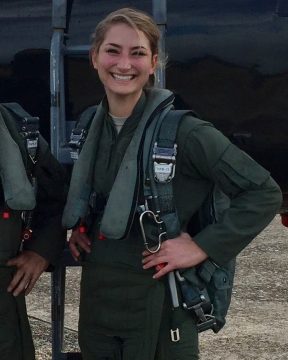
First Lieutenant Britney Petrina attended the U.S. Air Force Academy and served three years of active duty at Tyndall Air Force Base in Panama City, Florida, as a contract manager and plans and programs flight commander in the 325th Contracting Squadron.
“I learned the value of having good conflict resolution skills,” says Petrina, of her service time. “Also, flexibility really is key in the military—being able to adapt to new information or come up with new solutions was something I got to experience firsthand and it was very valuable.”
Petrina believes that her experiences at the academy allowed her to develop skills that will prove useful in becoming a physician. “As a cadet, you have to balance so many different activities—like physical fitness, aviation extracurricular activities, military requirements, and academic classes—so I got very good at managing my time and prioritizing tasks.”
Active duty also reinforced the value of family and her own personal health. “Working in contracting, the majority of the summer through the end of the fiscal year, things were pretty high-stress as we were trying to work as hard as possible to obligate government funds,” she explains.
“My squadron did a great job emphasizing how important it can be to maintain those relationships during stressful times and how important it is to take care of your health,” says Petrina. “It’s something that is much easier said than done, and it’s something I’m sure I’ll be working on for the rest of my career.”
Michael Sramek ’22
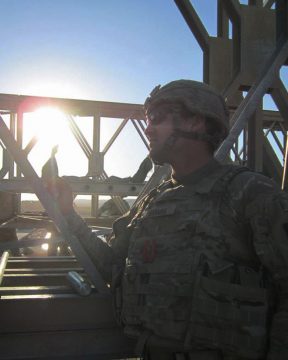
Serving in the Army as a combat engineer and bridge crewmember, Michael Sramek attained the rank of specialist (e-4).
“During my deployment to Afghanistan, I served as a team leader and was primarily responsible for maintaining the readiness of my team and for training them to exceed the standards set,” says Sramek.
Sramek’s team specialized in the construction of bridges to aid the people of Afghanistan, as well as to help the Army’s own movement throughout the country. “We also did some security and some route clearance as part of our overall mission,” he says.
During his time in Afghanistan, Sramek was injured, which “initially prompted me to look into medicine,” he says. “The most valuable lesson I learned in the military was that hard work beats luck every time. You have to be ready for all scenarios, and even if you’re well prepared you may face an impossible task. It’s important to separate the stresses of school and daily life from real life problems.”
Jacob Torrey ’22
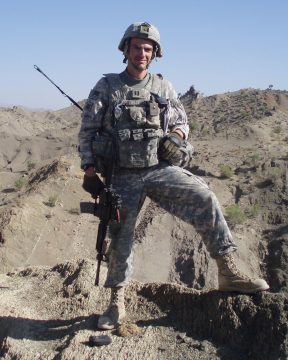
Commissioned as a second lieutenant of infantry in the Army after graduating from the U.S. Military Academy, Major Jacob Torrey was assigned to the 3-509 Infantry Battalion (Airborne) in Fort Richardson, Alaska.
Torrey deployed with that unit to Iraq in 2007 where he served as an airborne infantry rifle platoon leader, and again in 2009 to Afghanistan where he served as an airborne rifle company executive officer and commander of a provisional company.
As a commander, he led about 100 U.S. soldiers, as well as an element of about 20 Afghans, and served as the senior U.S. advisor to the Afghan civilian district sub-governor, Afghan police forces, and a company of the Afghan National Army.
“The Army taught me tremendous lessons about the importance of forming teams and working well with all people, regardless of their temperament or background,” says Torrey. “It also taught me to appreciate the world, society, and country that I live in.
“My path from the military to a career in medicine has been circuitous and indirect, but my service in the military has instilled me with a strong sense of duty and obligation to my community,” he says. “It has also taught me to address problems directly. I feel that I can best use my experience and be most useful to my community by becoming a physician.”